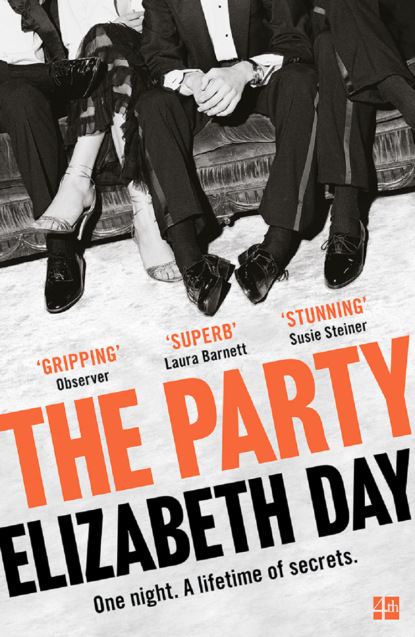По всем вопросам обращайтесь на: info@litportal.ru
(©) 2003-2024.
✖
The Party: The thrilling Richard & Judy Book Club Pick 2018
Автор
Год написания книги
2018
Настройки чтения
Размер шрифта
Высота строк
Поля
Ben raised his glass.
‘To us,’ he said, one hand still resting on his wife’s neck.
‘To our dear friends,’ I added. ‘Ben and Serena.’
Ben, more at ease now in a familiar pose of bonhomie, gave an expansive grin. His top three shirt buttons were undone, revealing a sprouting of dark hairs. He was tanned. He was always tanned from a recent holiday or golf game or simple genetic good fortune. He smelled of oak and leather – the same aftershave he’d been wearing for years, ever since his father gave him a bottle when he turned sixteen. He was handsome in an unexpected way. His mouth was perhaps too large, a little loose around the lips. His nose was arguably a bit flat. There were wrinkles across his brow. But when you put it all together, it worked. There was a ruggedness to his looks, a worn-in quality that suited the encroaching years. I had to admit: I’d never seen him look so good.
‘Yes,’ Serena said. ‘Friends.’
Lucy tipped the glass back to a forty-five-degree angle and sank most of the champagne in one gulp. I laid my hand on hers. Her skin felt hot. She placed the flute back on the counter, fingers shaking.
There was a noisy clatter from the far end of the room and then the sound of childish squawking.
‘Mama!’
A small, rotund shape bowled across the floor and launched himself at Serena’s legs. This was Hector who, at three years old, was the most obstreperous of the Fitzmaurice children.
‘My love,’ Serena cooed. She bent to pick him up, straining the sinews of her yoga-toned arms as she did so. Hector was a barrel-shaped child with a square head and un-charming features. His brow loomed over the sockets of his eyes, giving him the appearance of an elderly ape.
‘Hello, Hector,’ I said.
This unprepossessing lump was, I’m sad to say, my godson. To be frank, I was offended they had waited till their third progeny to ask and I’ve never wholly got over the slight. I am, however, punctilious in the observation of all my duties. He got an engraved silver tankard for his christening and has had a bottle of fine wine put aside for him every year since then at Berry Bros. Heaven knows what he will ever do to deserve it. He has none of Cosima’s grace or Cressida’s impishness. (The youngest, Bear, is still at the baby stage, so it’s hard to tell how he’ll turn out.)
‘Gah,’ the child responded.
Tucked cosily on his mother’s lap, he looked glumly out at the rest of us, clearly wishing us all to be gone. He started pawing at Serena’s blouse.
‘Mee-ma,’ he said. ‘Mee-ma, mee-ma.’ His voice rose to an un-ignorable pitch.
‘No, darling, not now. Mee-ma for later.’
She removed his chunky, dimpled hand from her breasts. Serena believes in attachment parenting. She breastfed Cosima until she was four and had a full set of teeth.
‘Could I have a top-up, Ben?’ Lucy was reaching out with her empty glass.
‘Sorry, darling. Should have noticed.’
He poured the champagne too quickly so that it bubbled up, almost to the rim, and he had to wait for the foam to slide back down. When her glass was full, Lucy took it and swallowed almost half of it in one go. I had noticed her drinking more over preceding months and I didn’t want her to be drunk tonight. It would be embarrassing and, apart from anything else, I needed an ally.
I cocked my head towards hers.
‘Don’t you think—’
‘No, Martin. No I don’t,’ she said, too loudly. Hector, startled by the sound of her voice, started crying.
‘Oh baby, oh no, oh baby, don’t cry,’ Serena cooed. She stroked his hair with her hand. ‘They didn’t mean to shout, did they? No they didn’t.’
Lucy glared at me. Then she leaned over and tapped the child’s podgy leg with one hand.
‘Hey, Hector.’ Tap tap tap. ‘Hey, hey. I’m sorry. Don’t be a baby.’ Tap tap tap. ‘You’re a big boy now, aren’t you? No need to cry.’ Tap tap tap.
When Lucy removed her hand, I could see a red mark on his thigh.
Serena turned her back to us, shielding Hector from our sight.
‘Shall I take him?’ Ben offered.
Serena stood without answering and walked out of the room with the screaming Hector. The sound of her rubber-soled espadrilles on the tiled floor as she left seemed designed to express her unvoiced fury.
Ben exhaled. He shrugged apologetically.
‘Don’t worry about it, Luce.’
‘I wasn’t,’ she said.
Ben laughed. ‘Good. That’s OK then.’
He walked to the fridge, which loomed in one corner of the kitchen, emitting a low-frequency hum.
‘Snacks,’ he announced to no one in particular, sliding out a platter covered in cling film and bringing it over to the table. He took the film off with a flourish. There was a selection of soggy-looking salmon blinis, a few slices of hard cheese that looked like Manchego and some mini-sandwiches cut into triangles. A smear of brown in the centre suggested leftover chutney that someone else had already eaten. Leftovers, I thought. So that’s all we’re worth.
‘You guys want some water?’
I reached for a blini. ‘Yes, please.’
He came back with a bottle in a familiar shade of light blue. I immediately recognised the label: the cursive green writing, the line drawing of those hills I used to see every day when I walked to lessons. It was Burtonbury mineral water, said to be the finest in Britain and drunk by no lesser person than the Queen.
Ben twisted the cap, releasing a fizzing jet of air. As he poured, the splash of liquid against glass cracked the ice cubes.
Martin
Burtonbury, 1989
BURTONBURY WAS SITUATED ON THE OUTSKIRTS of a picturesque Midlands town which had flourished in the late Victorian era thanks to an abundance of natural spring water. The school building had once been a hotel for gentlemen afflicted with rattling coughs or dyspeptic stomachs, and pale-faced women in black lace suffering from attacks of the vapours who travelled up from London with their valises and their maids in order to ‘take the cure’. It was the most fashionable place to be seen: the rehab centre of its day, where faded personalities would disappear for weeks on end in order to drink from the wells and soak in tepid baths with hot flannel compresses strapped to their fevered brows.
For a time, a handsome young doctor from Adelboden in Switzerland – called, rather wonderfully, Dr Schnitzel – took up residence as the medical director. When I arrived, there was a sepia photograph of him still hanging in the school’s entrance hall: a bearded man with curlicues of hair framing each ear, his eyes hooded, like a lugubrious Russian novelist.
But the water cure, just like the cabbage soup diet, was a transient fad and, after a while, Dr Schnitzel returned to Adelboden, the custom dried up and the red-brick, high Gothic Empire Hotel fell into a state of disrepair. It was requisitioned during the two world wars. In the 1950s, it was bought up by a couple from Birmingham who made it into a care home for the elderly, ripping out all the marble-floored bathrooms and hand-painted cornices and replacing the luscious carpets with a thin, hard-wearing material in institutional green.
It became Burtonbury in 1960, a boys’ boarding school designed initially to cater for the children of diplomats posted abroad. Through the years, it cultivated a reputation for middle-ranking academic rigour and some modest sporting success. It was a decent school, but it didn’t belong to the higher echelons of private education. It tried very hard to be Eton or Harrow and yet, like a newly minted millionaire who buys a bright blue Rolls-Royce without realising it should have been a petrol-black Bentley, it never quite outgrew its arriviste status. Burtonbury always languished just outside the top twenty in the annual league tables. The Tatler
Вы ознакомились с фрагментом книги.
Приобретайте полный текст книги у нашего партнера:
Приобретайте полный текст книги у нашего партнера:









